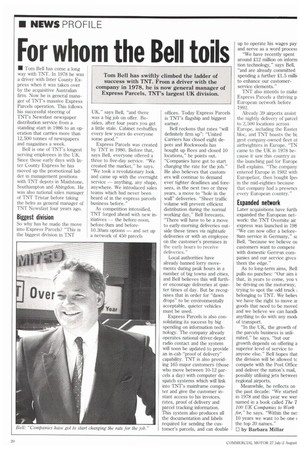For whom the Bell toils
Page 20

If you've noticed an error in this article please click here to report it so we can fix it.
• Tom Bell has come a long way with TNT. In 1978 he was a driver with Inter County Express when it was taken over by the acquisitive Australian firm. Now he is general manager of TNT's massive Express Parcels operation. This follows his successful steering of TNT's Newsfast newspaper distribution service from a standing start in 1986 to an operation that carries more than 12,500 tonnes of newspapers and magazines a week.
Bell is one of TNT's longest serving employees in the UK. Since those early days with Inter County Express he has moved up the promotional ladder in management positions with TNT depots in Maidstone, Southampton and Abingdon. He was also national sales manager of TNT Tristar before taking the helm as general manager of TNT Newsfast four years ago.
Biggest division
So why has he made the move into Express Parcels? "This is the biggest division in TNT UK," says Bell, "and there was a big job on offer. Besides, after four years you get a little stale. Cabinet reshuffles every few years do everyone some good."
Express Parcels was created by TNT in 1980. Before that, says Bell, everyone offered a three to five-day service. "We created the market," he says. "We took a revolutionary look and came up with the overnight service — anything, any shape, anywhere. We introduced sales teams which had never been heard of in the express parcels business before."
As competition intensified, TNT forged ahead with new initiatives — the before-noon, before-9am and before10.30am options — and set up a network of 450 parcels offices. Today Express Parcels is TNT's flagship and biggest earner.
Bell reckons that rates "will definitely firm up": "United Carriers has closed eight depots and Rockwoods has bought up Bees and closed 10 locations," he points out. "Companies have got to start charging the rate for the job." He also believes that customers will continue to demand ever tighter deadlines and foresees, in the next two or three years, a move to "hole in the wall" deliveries. "Sheer traffic volume will prevent efficient distribution during the normal working day," Bell forecasts. "There will have to be a move to early-morning deliveries outside these times via nightsafe deliveries or with an employee on the customer's premises in the early hours to receive deliveries."
Local authorities have already banned lorry movements during peak hours in a number of big towns and cities, and Bell believes this will further encourage deliveries at quieter times of day. But he recognises that in order for "dawn drops" to be environmentally acceptable, quieter vehicles must be used.
Express Parcels is also consolidating its success by big spending on information technology. The company already operates national driver-depot radio contact and the system will soon be updated to provide an in-cab "proof of delivery" capability. TNT is also providing 165 major customers (those who move between 10-12 parcels a day) with computer despatch systems which will link into TNT's mainframe computer and give the customer instant access to his invoices, rates, proof of delivery and parcel tracking information. This system also produces all the documentation and labels required for sending the customer's parcels, and can double up to operate his wages pay and serve as a word proces: "We have recently spent around £12 million on inform tion technology," says Bell, "and are already committed spending a further 21.5 milli to enhance our customerservice elements."
TNT also intends to make Express Parcels a thriving p European network before 1992.
Already 39 airports assist the nightly delivery of parcel to 2,500 locations across Europe, including the Easter bloc, and TNT boasts the bi gest company-owned fleet of airfreighters in Europe. "TN came to the UK in 1978 because it saw this country as the launching pad for Europe Bell explains. "The company entered Europe in 1982 with Europefast, then bought Ipei in the mid-eighties because that company had a presena every European country."
Expanded network
Later acquisitions have Furth expanded the European network: the TNT Overnite air express was launched in 198 "We can now offer a before9am service in Germany," si Bell, "because we believe ou customers want to compete with domestic German companies and our service gives them the edge."
As to long-term aims, Bell pulls no punches: "Our aim if that, in years to come, you N be driving on the motorway, trying to spot the odd truck belonging to TNT. We belies we have the right to move al goods that need to be moved and we believe we can handlt anything to do with any mock of transport.
"In the UK, the growth of the parcels business is unlimited," he says, "but our growth depends on offering a superior level of service to anyone else." Bell hopes that the division will be allowed tc compete with the Post Office and deliver the nation's mail, possibly utilising jets betweef regional airports.
Meanwhile, he reflects on the past decade: "We started in 1978 and this year we wer named in a book called The 7 100 UK Companies to Work for," he says. "Within the ne: 10 years we want to be one the top 20 names."
0 by Barbara Millar




































































































































